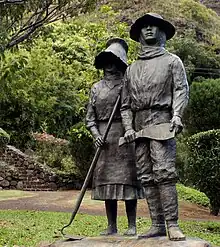
The Japanese Problem, also referred to as the Japanese Menace or the Japanese Conspiracy, was the name given to racial tensions in Hawaii between the European-American sugarcane plantation owners and the Japanese immigrants hired to work in the cane fields.
Origins
The term "Japanese Problem" came into use during the 1920 Oahu Sugar Strike.
Following the strike, powerful European-Americans like Walter Dillingham and Harry Baldwin were vocal about their concerns regarding the increasing Japanese population in Hawaii. They worried that the increasing Japanese population would eventually affect politics in Hawaii as the voter base changed. Ultimately, they were most concerned that the Japanese were loyal to Japan, and would allow the Japanese Empire to claim Hawaii.[1]
Wallace Farrington pointed out in a speech in 1920 that even though the strikes were caused by "malcontents and agitators", the Japanese had to be given the chance to Americanize. This notion was pushed back against by people both within Hawaii and on the U.S. Mainland, like Valentine McClatchy, who claimed that the Japanese could not integrate into American culture because they held on to their own culture and religion too fervently.[2]
Further reading
- Millis, Harry Alvin (1915). The Japanese Problem in the United States: An Investigation for the Commission on Relations with Japan Appointed by the Federal Council of the Churches of Christ in America. MacMillan.
- Duus, Masayo Umezawa (1999). The Japanese Conspiracy: The Oahu Sugar Strike of 1920. University of California Press. ISBN 9780520204850.
References
- ↑ Hawaiʻi at the crossroads of the U.S. and Japan before the Pacific War. Davidann, Jon Thares, 1961-. Honolulu: University of Hawai'i Press. 2008. ISBN 9781441619839. OCLC 456567405.
{{cite book}}: CS1 maint: others (link) - ↑ Asian Americans : an encyclopedia of social, cultural, economic, and political history. Zhao, Xiaojian, 1953-, Park, Edward J. W. Santa Barbara, California. 2014. ISBN 9781598842395. OCLC 836261675.
{{cite book}}: CS1 maint: location missing publisher (link) CS1 maint: others (link)